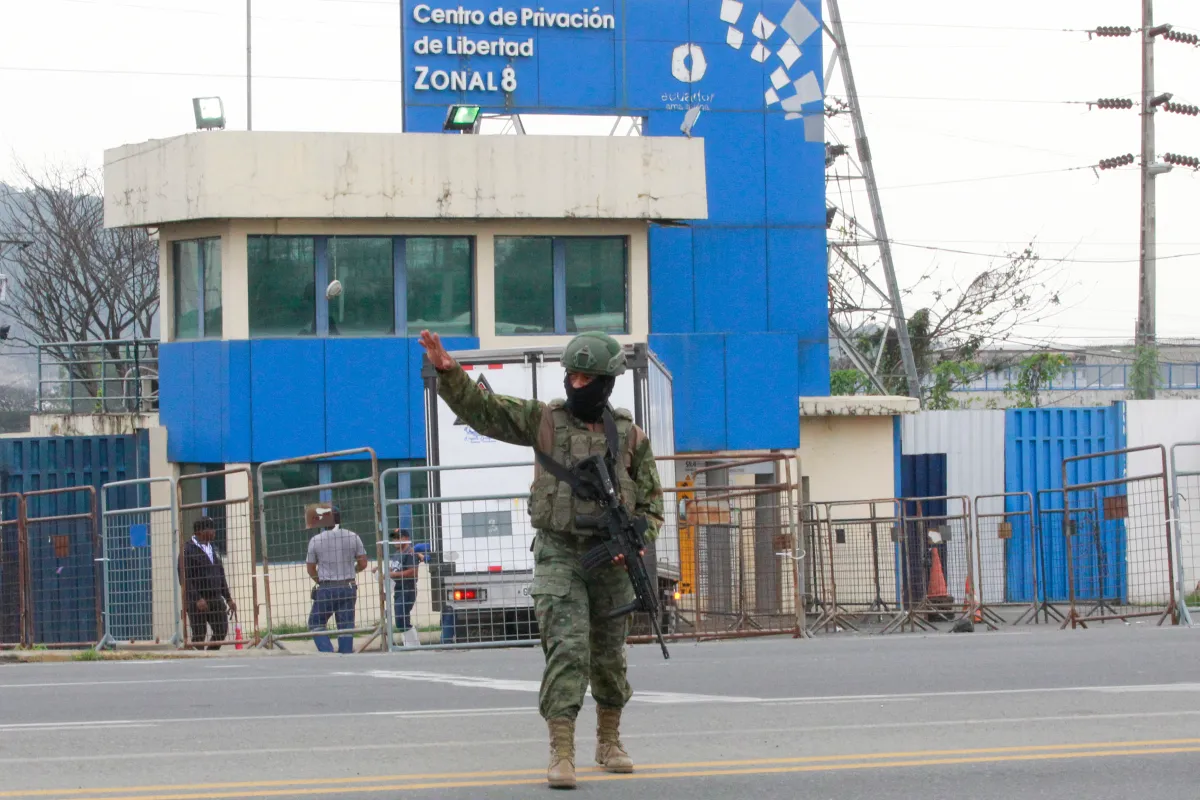International
The director of Ecuador’s largest prison is shot dead

The director of the Litoral Penitentiary, the largest and most populous prison in Ecuador, was killed this Thursday in an attack where another prison official who accompanied her at the time of the attack was injured, according to the National Service for Comprehensive Care for Persons Deprived of Liberty (SNAI), the State penitentiary agency.
The attack against María Daniela Icaza and her companion occurred around 18:00 local time (23:00 GMT) on the road between the town of Daule and the city of Guayaquil, where the Litoral Penitentiary is located.
Icaza was heading to the Guasmo Sur Hospital, which is located in the south of Guayaquil, when according to local media, armed men intercepted the vehicle and shot at her, who was in the co-pilot’s seat.
At first, the SNAI reported that Icaza had managed to get to the hospital alive, but later confirmed his death.
This is the second murder of the highest prison authority in nine days, after Álex Guevara, director of the Lago Agrio prison, in the Amazonian province of Sucumbíos, was murdered in similar circumstances on September 3.
One of the most important prisons in Ecuador
The Litoral Penitentiary, officially known as the Guayas Male Freedom Deprivation Center Number 1, is the largest of the five prisons that make up the Guayaquil penitentiary complex, in which approximately 12,000 prisoners are detained.
More than 6,000 are in the Litoral Penitentiary, which between 2021 and 2023 was the scene of the worst massacres that occurred due to clashes between criminal gangs that disputed internal control, at least until the militarization of these centers ordered at the beginning of the year by President Daniel Noboa.
The entry of the military into the prisons took place within the framework of the state of emergency and “internal armed conflict” declared by the ruler against organized crime, which is attributed to a boom in criminal violence that has led Ecuador to be the country in Latin America with the highest homicide rate, registering 47.2 per 100,000 inhabitants in 2023.
The wave of murders has also previously claimed the lives of other prison directors, as well as municipal authorities, including several mayors, and on a national scale, such as presidential candidate Fernando Villavicencio.
International
Dominican ‘False Hero’ Arrested for Faking Role in Nightclub Collapse That Killed 231

A man identified as Rafael Rosario Mota falsely claimed to have rescued 12 people from the collapse of the Jet Set nightclub in Santo Domingo—a tragedy that left 231 people dead—but he was never at the scene.
Intelligence agents in the Dominican Republic arrested the 32-year-old man for pretending to be a hero who saved lives during the catastrophic incident, authorities announced.
Rosario Mota had been charging for media interviews in which he falsely claimed to have pulled survivors from the rubble after the nightclub’s roof collapsed in the early hours of April 8, during a concert by merengue singer Rubby Pérez, who was among those killed.
“He was never at the scene of the tragedy,” the police stated. The arrest took place just after he finished another interview on a digital platform, where he repeated his fabricated story in exchange for money as part of a “media tour” filled with manipulated information and invented testimonies.
“False hero!” read a message shared on the police force’s Instagram account alongside a short video of the suspect, in which he apologized: “I did it because I was paid. I ask forgiveness from the public and the authorities.”
Central America
Nicaraguan Exiles to Mark 7th Anniversary of 2018 Protests with Global Commemorations

The Nicaraguan opposition in exile announced on Thursday that it will commemorate the seventh anniversary of the April 2018 protests against the government of President Daniel Ortega and his wife, Rosario Murillo, with events in Costa Rica, the United States, and several European countries.
The commemorative activities—which will call for justice for the victims, as well as freedom and democracy for Nicaragua—will include religious services, public forums, cultural fairs, and other public gatherings, according to official announcements.
In April 2018, thousands of Nicaraguans took to the streets to protest controversial reforms to the social security system. The government’s violent response quickly turned the demonstrations into a broader call for the resignation of President Ortega, who is now 79 and has been in power since 2007.
The protests resulted in at least 355 deaths, according to the Inter-American Commission on Human Rights (IACHR), although Nicaraguan organizations claim the toll is as high as 684. Ortega has acknowledged “more than 300” deaths and maintains the unrest was an attempted coup d’état.
International
Arsenal stun Real Madrid at the Bernabéu to reach Champions League semifinals

Arsenal enjoyed a “historic night” on Wednesday after defeating Real Madrid 2-1 at the Santiago Bernabéu, knocking them out of the Champions League quarterfinals, midfielder Declan Rice said.
“It’s such a special night for this club, a historic night for this club,” said Rice, who scored twice in the first leg in London, speaking to TNT Sports.
The English international was named Man of the Match in both legs — the 3-0 win in London and the second leg in Madrid.
“It’s amazing. I knew we were on an upward trajectory and we’ve done incredibly well in this competition. We deserve it and we have full confidence in our coach. Reaching the semifinals is unbelievable,” Rice added.
-

 International4 days ago
International4 days agoNightclub Collapse in Dominican Republic Claims 226 Lives
-

 International4 days ago
International4 days agoVenezuela accuses Guyana of “warlike intentions” after UK defense deal
-

 Central America3 days ago
Central America3 days agoHonduran Police Offer $135K for Tips Leading to the Arrest of Romeo Vásquez
-

 Central America2 days ago
Central America2 days agoPetro questions Ecuador’s vote, cites reports of military control and arrests
-

 International3 days ago
International3 days agoMPV Denounces Electoral Blockade as Secretary-General is Disqualified for May Elections
-

 International3 days ago
International3 days agoMaduro Plans Major Workers’ March on May 1st to Defend Venezuela’s Freedom
-

 International1 day ago
International1 day agoArsenal stun Real Madrid at the Bernabéu to reach Champions League semifinals
-

 International1 day ago
International1 day agoBogotá residents line up for yellow fever vaccine amid national alert
-

 International1 day ago
International1 day agoMexico refuses to restore ties with Ecuador while Noboa remains in office
-

 International2 days ago
International2 days agoColombia: Search continues for missing limb of italian scientist found dismembered
-

 International1 day ago
International1 day agoDeSantis’ immigration crackdown sparks alarm in Venezuelan Communities in Doral
-

 International2 hours ago
International2 hours agoDominican ‘False Hero’ Arrested for Faking Role in Nightclub Collapse That Killed 231
-

 Central America2 hours ago
Central America2 hours agoNicaraguan Exiles to Mark 7th Anniversary of 2018 Protests with Global Commemorations















